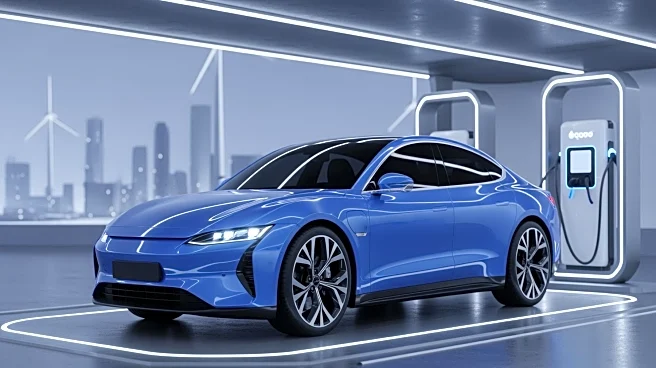What's Happening?
Tesla has introduced more affordable versions of its Model Y and Model 3 electric vehicles, aiming to make its cars accessible to a wider audience. The new variants, known as the Model Y Standard Rear-Wheel Drive and Model 3 Standard Rear-Wheel Drive,
feature stripped-back designs that maintain the core driving experience while reducing costs. The Model Y Standard starts at $39,990, offering an EPA-estimated range of 321 miles and a peak charging rate of 225 kW. It includes features like a 7-speaker audio system and manual cabin adjustments. Similarly, the Model 3 Standard is priced at $36,990, sharing many hardware and software characteristics with the Model Y, including a 69 kWh battery and touchscreen-controlled seat adjustments. Both models are designed to appeal to first-time electric vehicle buyers by offering long-range, fast-charging capabilities at a lower price point.
Why It's Important?
The introduction of more affordable Tesla models is significant as it addresses the growing demand for cost-effective electric vehicles in the U.S. market. With the average new vehicle transaction price in the U.S. at $48,644, Tesla's new offerings provide a more accessible entry point for consumers interested in electric vehicles. This move could potentially increase Tesla's market share by attracting buyers who might otherwise consider cheaper alternatives. By focusing on affordability, Tesla reinforces its position as a leader in the electric vehicle industry, emphasizing its commitment to making sustainable transportation options available to a broader demographic.
What's Next?
Tesla's strategy to offer more affordable electric vehicles may prompt other automakers to reevaluate their pricing structures and product offerings. As competition in the electric vehicle market intensifies, companies may seek to innovate and reduce costs to attract budget-conscious consumers. Additionally, Tesla's decision to omit certain luxury features in favor of affordability could influence future design and marketing strategies within the industry. The success of these new models will likely be monitored closely, potentially leading to further adjustments in Tesla's product lineup and pricing strategies.
Beyond the Headlines
Tesla's shift towards affordability may have broader implications for the electric vehicle industry, including potential changes in consumer perceptions and expectations. As more consumers gain access to electric vehicles, there could be increased pressure on infrastructure development, such as charging stations, to accommodate growing demand. Furthermore, Tesla's approach highlights the evolving landscape of automotive design, where functionality and cost-effectiveness are increasingly prioritized over luxury features.















